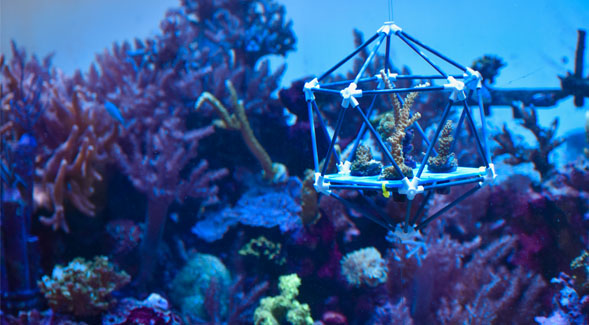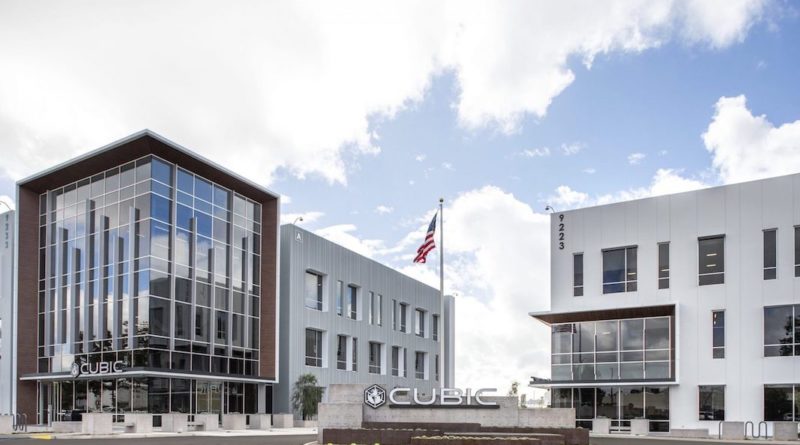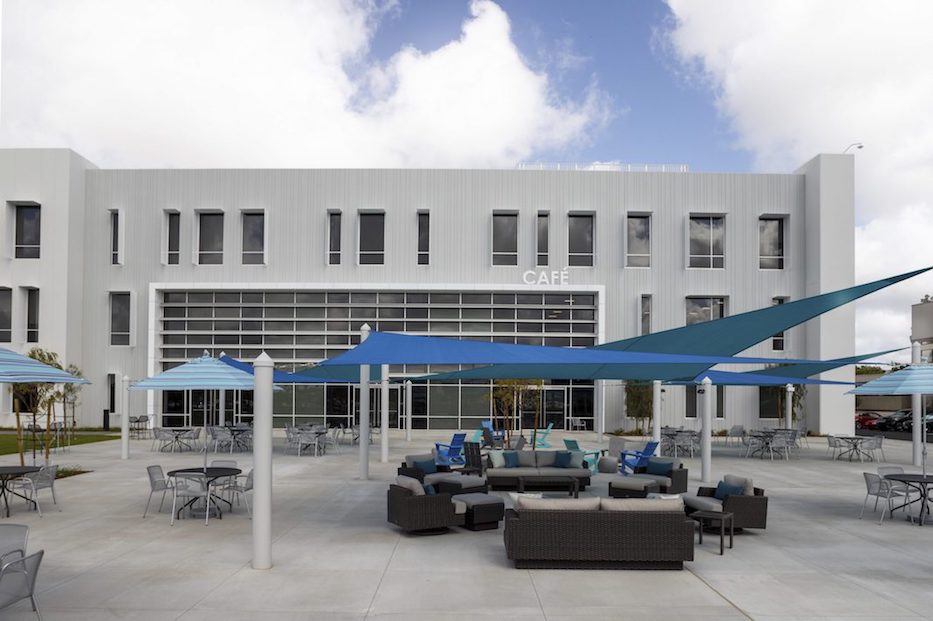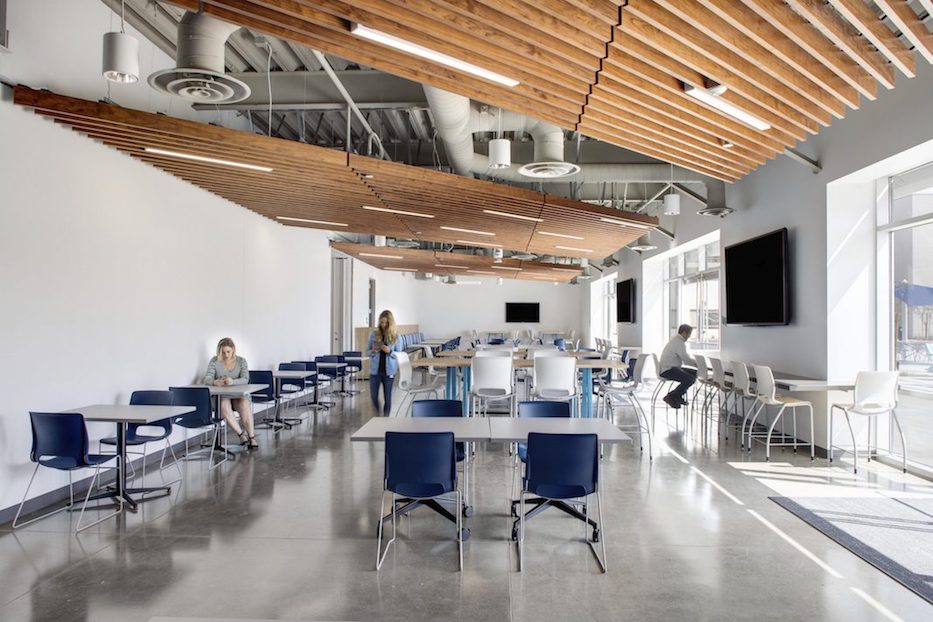Daily Business Report: Oct. 26, 2021
Cubic Corporation’s newly completed headquarters
brings its San Diego-based workforce together
Cubic Corporation, the 70-year-old San Diego company that serves the defense and transportation industries, has witnessed the completion of its new headquarters on Balboa Avenue in Kearny Mesa, the result of combining its two main campuses into one.
Groundbreaking for the new headquarters occurred in July 2019. Cubic partnered with Cisterra Development for the construction. The entire design was handled by Ware Malcolm, an award-winning international design firm.
Two 125,000-square-foot, three-story buildings were built on the site at 9333 Balboa Ave.
Ware Malcolm said the architectural design for the new buildings uses Cubic branding as a focal point for the project. Many design features were incorporated in the main entrance and lobby areas featuring a floating Cubic logo, a three-story feature stair that wraps the exterior glass wall, promoting interaction and movement through the space. Including the new facilities, the overall campus square footage totals approximately 415,000 square feet.
The overall office design features a modern and efficient workplace to promote cross-pollination between departments and encourage innovation. Ware Malcomb also designed various amenities spaces throughout the campus including a full-size kitchen/café, outdoor lounge, conferencing center and a fitness center. The cafe features a glass wall designed to reduce solar heat in the summer and allow the sunlight to warm the interior slab during colder months.
PHOTOs by Haley Hill Photography
Zyter and Qualcomm partner to implement
state-of-the-art smart warehouse
Zyter announced it is implementing a state-of-the-art, next-generation smart warehouse for OneScreen located in San Diego, which will be equipped with products from Qualcomm Technologies Inc.
The smart warehouse design for OneScreen plans to include an LTE-private network, implementation of a digital twin, robust warehouse management system, autonomous mobile robots (AMR), AR/VR technologies, IoT sensors and more.
The modern smart warehouse will increase warehouse operational efficiencies, enable automated inventory control, enhance safety and security within the facility and save time and money for OneScreen employees and customers, according to Zyter.
“This smart warehouse project exemplifies how Qualcomm Technologies and its IoT ecosystem are critical to enabling the global digital transformation of industries with a differentiated approach that leverages the growing number of smart devices that make up the connected intelligent edge,” said the company in a release.

San Diego State University researchers
join the fight to save the coral
San Diego State University Ph.D. candidate Jason Baer is on a mission to restore coral reefs that have been damaged by climate change, overfishing or tourism by using ark structures, the first of their kind.
Baer and his fellow lab members, led by SDSU microbial ecologist and virologist Forest Rohwer, deploy the large, geodesic structures in the midwater above the ocean floor and seed them with corals and organisms that support their health. The arks, similar to the Noah’s Ark concept, give the threatened communities of coral a second chance to thrive.
Their positioning in midwater, where there’s higher light and flow, offers an improved environment for corals and their allies and distances them from some of the stressors they face on the seafloor, such as sedimentation and suffocation.
Baer, along with Rohwer lab members Anneke van der Geer, Andres Sanchez-Quinto, and Mark Little, spent six weeks in Curaçao, a Caribbean island, working with the CARMABI marine station this past summer. Together they deployed the first arks on coral reefs and began studying the communities that recruited them, with the goal of watching a reef community “build” itself.
Three regional clean energy companies graduate
from Cleantech San Diego Business Accelerator
Cleantech San Diego announced the graduation of local clean energy companies Aquacycl, Kitu Systems and Nuvve from its Southern California Energy Innovation Network (SCEIN).
SCEIN is an accelerator program for clean energy startups based in San Diego, Riverside, San Bernardino, and Imperial counties that are developing technologies to help California meet its clean energy goals. The program offers free business services through a consortium of regional partner organizations to help energy entrepreneurs successfully bring their innovations to market.
Since entering SCEIN in 2017/2018, Aquacycl, Kitu Systems, and Nuvve have secured multiple customers, built robust sales pipelines, and raised sufficient capital to support the scaling of their breakthrough energy businesses. A company graduates from SCEIN when it is mutually agreed that they have utilized the full range of resources and referrals made available to them. Seven regional clean energy companies have now graduated after receiving customized business service plans from the program.
California may soon impose new water restrictions.
Here’s what that means in San Diego
San Diegans could be forgiven for not knowing how seriously to take California’s current drought. Gov. Gavin Newsom declared a statewide emergency last week, reiterating a desire that urban water users from San Diego to Sacramento voluntarily cut consumption by 15 percent. That would bring water use back down to roughly where it was in 2016, after then-Gov. Jerry Brown issued the state’s first-ever mandatory drought restrictions.
However, the San Diego County Water Authority has repeatedly assured residents that the region has enough water for another year, maybe two. And after Newsom’s announcement, officials with the wholesaler called on San Diego to slash water by just 10 percent, while again downplaying the urgency of the situation.
San Diego research centers receive $15 million to train
next generation of regenerative medicine scientists
Three San Diego research institutions have been awarded nearly $15 million from the California Institute of Regenerative Medicine (CIRM) to train the next generation of scientists in regenerative medicine, a field of research that holds great promise for generating transformative medicines.
Sanford Burnham Prebys, Scripps Research and University of California San Diego each received grants of around $5 million from CIRM to support the training of graduate students, postdoctoral trainees, and clinical trainees.
Sanford Burnham Prebys received $4,931,353 to launch a multidisciplinary stem cell training program. The grant will provide funds for competitive awards for Ph.D. students, postdocs and clinical fellows in stem cell, gene therapy and regenerative medicine fields at the institute.
UC adopts recommendations for responsible
use of artificial intelligence
The University of California has adopted a set of recommendations to guide the safe and responsible deployment of artificial intelligence in UC operations and three researchers at UC San Diego were involved with the effort.
UC becomes one of the first universities in the nation to establish overarching principles for the responsible use of artificial intelligence (AI) and a governance process that prioritizes transparency and accountability in decisions about when and how AI is deployed.
The recommendations were developed by the University of California Presidential Working Group on Artificial Intelligence. The group was launched in 2020 by UC President Michael V. Drake and former UC President Janet Napolitano.
The group included three UC San Diego faculty. Nadia Henninger is an associate professor whose work focuses on cryptography and security. Lawrence Saul is a professor whose research interests are machine learning and data analysis. Camille Nebeker is a professor who co-founded and directs the Research Center for Optimal Digital Ethics Health at UC San Diego.
Quitang Li, Neurophth CSO, named to
Top 25 Women Leaders in Biotechnology
Neurophth Therapeutics Ltd., a genomic medicines company seeking to improve lives through the curative potential of gene therapies, announced that Qiutang Li, Neurophth’s chief scientific officer, has been listed as one of The Top 25 Women Leaders in Biotechnology of 2021 by The Healthcare Technology Report.
Qiutang Li has over 30 years of experience in basic and applied biomedical research with extensive knowledge in gene therapy for hepatic deficiencies, ocular diseases, and viral vector reconstruction.
She joins Neurophth from the University of Louisville School of Medicine, where she was a tenured professor in the Department of Ophthalmology and Visual Sciences for over 14 years. Throughout her career, Li has published more than 45 publications in peer-reviewed journals. She earned both of her bachelor and master’s degrees in genetics from Peking University, China, and her doctoral degree in molecular cell biology from Washington University, St. Louis.
Tower 16 Capital Partners acquires
multifamily propery in Moreno Valley
San Diego-based Tower 16 Capital Partners has acquired Sorelle Apartments, a 330-unit multifamily property located in Moreno Valley, Calif., for $85 million. The Sorelle Apartments project was built in 1986 and was acquired from a private seller in an off-market transaction.
Tower 16 was represented by Ed Rosen of Berkadia’s San Diego office. NorthMarq helped secure debt financing for the buyer, led by Bryan Mummaw and Bryan Liu.
COASTER train increasing service
between Oceanside and San Diego
Commuters, residents and visitors now have a new option to getting from Oceanside to San Diego and everywhere in between along the coastline. The COASTER train is increasing service to 30 daily trips Monday through Friday, with an additional two on Fridays. On Saturday and Sunday, daily trips grow to 20 all year-round.
Not only will the increased service allow commuters and recreational travelers an affordable, and more flexible transportation option, it will help reduce congestion along the I-5 corridor. Just as important, the increased service supports regional goals to reduce vehicle miles traveled and greenhouse gas emissions.
The increase in the number of COASTER trips fulfills customer requests for more frequent service and evening trips. The expanded COASTER service is fully funded through TransNet, the county-wide half-cent sales tax approved by more than two-thirds voters for transportation projects administered by the San Diego Association of Governments






